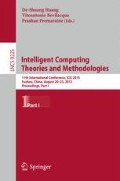Abstract
The description of image region draws a lot of attention in the field of computer vision. Recently, many descriptors were proposed for image region description and achieved high achievements. These descriptors are widely used in many fields, such as object recognition, image mosaic, video tracking. In this paper, we first systematically analyze six typical descriptors: SIFT, DAISY, MROGH, MRRID, LIOP and HRI-CSLTP descriptors. Then we conduct experiments in several different situations to evaluate the performance of these descriptors. From the experimental results, we get to make a conclusion and analysis about the advantages and disadvantages of these descriptors. Finally, we make an application of these descriptors in image matching field.
Access this chapter
Tax calculation will be finalised at checkout
Purchases are for personal use only
References
Lowe, D.G.: Distinctive image features from scale-invariant keypoints. Int. J. Comput. Vis. 60(2), 91–110 (2004)
Furukawa, Y., Ponce, J.: Accurate, dense, and robust multiview stereopsis. Pattern Anal. Mach. Intell. 32(8), 1362–1376 (2010)
Matas, J., Chum, O., Urban, M., et al.: Robust wide-baseline stereo from maximally stable extremal regions. Image Vis. Comput. 22(10), 761–767 (2004)
Mikolajczyk, K., Schmid, C.: An affine invariant interest point detector. In: Heyden, A., Sparr, G., Nielsen, M., Johansen, P. (eds.) ECCV 2002, Part I. LNCS, vol. 2350, pp. 128–142. Springer, Heidelberg (2002)
Tuytelaars, T., Van, G.L.: Matching widely separated views based on affine invariant regions. Int. J. Comput. Vis. 59(1), 61–85 (2004)
Tola, E., Lepetit, V., Fua, P.: Daisy: an efficient dense descriptor applied to wide-baseline stereo. Pattern Anal. Mach. Intell. 32(5), 815–830 (2010)
Fan, B., Wu, F., Hu, Z.: Aggregating gradient distributions into intensity orders: a novel local image descriptor. In: Computer Vision and Pattern Recognition, pp. 2377–2384 (2011)
Fan, B., Wu, F., Hu, Z.: Rotationally invariant descriptors using intensity order pooling. Pattern Anal. Mach. Intell. 34(10), 2031–2045 (2012)
Wang, Z., Fan, B., Wu, F.: Local intensity order pattern for feature description[C] .In: Computer Vision (ICCV), pp. 603–610 (2011)
Heikkilä, M., Pietikäinen, M., Schmid, C.: Description of interest regions with local binary patterns. Pattern Recogn. 42(3), 425–436 (2009)
Ojala, T., Pietikainen, M., Maenpaa, T.: Multiresolution gray-scale and rotation invariant texture classification with local binary patterns. Pattern Anal. Mach. Intell. 24(7), 971–987 (2002)
Gupta, R., Patil, H., Mittal, A.: Robust order-based methods for feature description. In: Computer Vision and Pattern Recognition, pp. 334–341 (2002)
Mikolajczyk, K., Schmid, C.: A performance evaluation of local descriptors. Pattern Anal. Mach. Intell. 27(10), 1615–1630 (2005)
Goswami, B., Chan, C. H., Kittler, J., et al.: Local ordinal contrast pattern histograms for spatiotemporal, lip-based speaker authentication. In: Biometrics: Theory Applications and Systems, pp. 1–6 (2010)
Mikolajczyk, K., Schmid, C.: Scale & affine invariant interest point detectors. Int. J. Comput. Vis. 60(1), 63–86 (2004)
Nister, D., Stewenius, H.: Scalable recognition with a vocabulary tree. In: Computer Vision and Pattern Recognition, pp. 2161–2168 (2006)
Brown, M., Lowe, D.G.: Automatic panoramic image stitching using invariant features. Int. J. Comput. Vis. 74(1), 59–73 (2007)
Zhang, J., Marszałek, M., Lazebnik, S., et al.: Local features and kernels for classification of texture and object categories: a comprehensive study. Int. J. Comput. Vis. 73(2), 213–238 (2007)
Acknowledgements
This work is supported by the National Natural Science Foundations of China (NSFC) (61370110, 61402004 & 61402003).
Author information
Authors and Affiliations
Corresponding author
Editor information
Editors and Affiliations
Rights and permissions
Copyright information
© 2015 Springer International Publishing Switzerland
About this paper
Cite this paper
Shi, K., Gao, Q., Lu, Y., Zhang, W., Sun, D. (2015). A Comparison of Local Invariant Feature Description and Its Application. In: Huang, DS., Bevilacqua, V., Premaratne, P. (eds) Intelligent Computing Theories and Methodologies. ICIC 2015. Lecture Notes in Computer Science(), vol 9225. Springer, Cham. https://doi.org/10.1007/978-3-319-22180-9_24
Download citation
DOI: https://doi.org/10.1007/978-3-319-22180-9_24
Published:
Publisher Name: Springer, Cham
Print ISBN: 978-3-319-22179-3
Online ISBN: 978-3-319-22180-9
eBook Packages: Computer ScienceComputer Science (R0)

